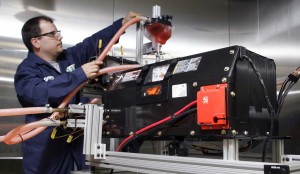Korea’s LG Chem will invest $303 million to set up a plant in Western Michigan to produce enough lithium-ion batteries to power as many as 200,000 electric vehicles annually.
The primary customer for the LIon technology will be General Motors, which last year chose LG Chem to provide batteries for the Chevrolet Volt, an extended-range electric vehicle, or E-REV, which GM plans to put into production this coming November. But the size of the new plant, which will be built in Holland, Michigan, suggests LG could seek other customers, as well.
The announcement is significant for several reasons. As part of the partnership they formed last year, GM and LG Chem set up a plant in suburban Detroit to assemble battery packs for the Volt, but the basic cells used in those packs have been coming from LG’s plants in the Far East.
Until now, the bulk of lithium-ion production has been based in Asia, primarily Japan, China and South Korea. But with the auto industry ramping up plans for new battery cars – and with the Obama Administration offerings billions of dollars in loans and grants – production is begin to expand in the United States.
Half of the cost of the Holland, Michigan facility will be funded through a $151.4 million Department of Energy grant. Federal funds will help Johnson Controls Inc. set up a competing facility just two miles away. And a government grant is allowing Indianapolis-based EnerDel to expand its own facility, which will provide batteries to both Think, a Norwegian-based EV maker, and Volvo.
The 650,000 square-foot LG plant – which will be operated by its U.S. subsidiary, Detroit-based Compact Power, Inc. – is expected to go into operation in 2012, and by 2013, it should employ 400 workers. Initially, it will have capacity to produce enough cells for 50,000 vehicles of the size of the Volt, which uses 16 kilowatt-hours of lithium-ion cells. Eventually, that could grow to more than 200,000 vehicles.
Having a plant capable of producing the raw chemistry of lithium-ion batteries is critical to the nation’s energy independence, experts argue, one of the reasons for the federal support.
But there are more practical reasons, stressed Tony Posawatz, line director for the Chevy Volt program. Ironically, while LIon batteries will have to “live” in one of the most demanding environments possible, under the hood of a car, the technology is finicky. Engineers take a number of steps, with a vehicle like Volt, to ensure the batteries can last more than 10 years and 100,000 miles.
Currently, they also have to take steps to simply make sure the battery cells survive a long journey from a plant in Korea. (Because of potential fire hazards, bulk shipments of LIon batteries are barred from aircraft.)
“You take them by boat,” said Posawatz, in an interview with TheDetroitBureau.com, “and the moisture, temperature variations and being rocked around” can cause cells to fail unless they are carefully protected. “Add duties and tariffs, and the added cost increases the price by hundreds of dollars per vehicle.”
There’s also the issue of lead-time. Automakers like GM prefer to have suppliers operate as close to their assembly plants as possible. That makes it easier to sync production – and to catch and correct unanticipated problems. Bringing in batteries from Korea, sajd Posawatz, means a defect that creeps into the system might not be discovered for months.
Western Michigan has been a long and well-established supply base for traditional automotive manufacturing. Like other regions dependent upon the auto industry, it has been working hard to attract advanced technology providers, such as LG Chem.
Asked why it chose Holland, Kee Eun, a Compact Power director, told MLive.com, “Because they have experience with the work force and their work ethic, it made a pretty strong impression on us.”
Industry sources say an unspoken part of the attraction for the region is that it does not have a strong presence by the United Auto Workers Union, which many foreign suppliers and auto manufacturers have strived to avoid.
While much of the money being invested in battery production is aimed at supplying the auto industry, LIon technology is also seen as having strong potential serving so-called stationary sources, ranging from home backup systems to load leveling for large utility companies. That could prove especially important as the country moves to more renewable sources of energy. It will be critical to find ways to avoid the ebb-and-flow of “green” power sources, such as wind and solar, and large-scale battery “farms” may appear across the country, experts say, in the coming years.

